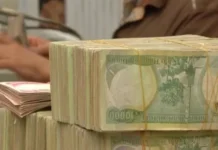
A report from Standard & Poor’s Credit Rating Agency (S&P) states that Iraq’s credit rating is still B–/B, with a stable outlook. The report emphasizes Iraq’s financial and economic stability.
The Iraqi Ministry of Finance approved a report, and its findings were shared in a statement received by the Shafaq News agency. The report notes that the new classification is a result of the Ministry’s ongoing economic and financial reforms, as well as its ability to maintain foreign currency reserves that exceed public debt and meet external financial obligations due to the stable crude oil prices.
The report utilized various indicators to classify its findings, with the most significant being the Iraqi parliament’s endorsement of the tripartite budget for the years 2023, 2024, and 2025. The budget aims to boost infrastructure projects and economic necessities. Additionally, the formation of the government by the end of 2022 has resulted in a period of political stability.
According to the report, it is predicted that there will be a significant surplus in Iraq’s current account that aligns with economic expectations. This surplus will further strengthen the country’s foreign currency reserves, which will help Iraq in servicing its debt for the next year.
According to the agency’s predictions, there will be a yearly economic growth of 2.6% from 2023 to 2026. This growth is attributed to an increase in oil production, which will have a positive impact on non-oil industries. Additionally, the annual inflation rates are expected to decrease to 4% by July 2023, after being around 5-6% in 2021 and 2022. This decrease is due to various government measures, including currency revaluation, price control, and support for food and energy prices.
According to the agency’s report, Iraq’s credit rating could improve if there is a high rate of economic growth, diversification of the public financial revenues from both oil and non-oil sources, an increase in the per capita share of national income, and the continuation of financial and economic policy reforms.



